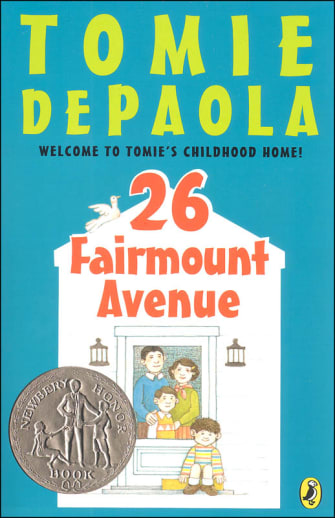Tomie DePaola's books have such a recognizable look to them. This story is about his childhood home in Connecticut. It's his first chapter book, but he manages to add some of his charming illustrations along the way. You learn about a memorable hurricane, his neighbors, his family, including Nana Upstairs and Nana downstairs, his first day of school, and all the fun he has at his new house back in the 1930s and 40s. 60pgs, pb. ~ Sara
26 Fairmount Avenue
SKU
003442
ISBN
9780698118645
Grade 1-3
These icons are designed to help you quickly understand and learn important information about our products.
Teaching Method
Traditional
Teacher-centered curriculum commonly used in classrooms that may include a text, teacher manual, tests, etc.
Charlotte Mason
A methodology based on the work of a 19th century educator who maintained that children learn best from literature (Living Books), not textbooks.
Classical
A methodology based on the Latin Trivium (three stages of learning), including the grammar stage (memorization and facts), logic stage (critical thinking), and rhetoric stage (developing/defending ideas).
Unit Study
A thematic or topical approach centered around one topic that integrates multiple subject areas.
Montessori (Discovery)
A methodology based on the work of a 20th century educator that emphasizes student and sensory-driven discovery learning and real-life applications.
Other
Other methodologies
Religious Content
Secular
Contains content contrary to common Christian beliefs (i.e. evolution).
Neutral
Avoids religious or theoretical topics or presents multiple viewpoints without preference.
Christian/Religious
Faith-based or including instructional religious content.
Learning Modality
Auditory
Learns through listening, talking out loud or reading out loud.
Visual
Learns through seeing, prefers written instructions and visual materials.
Kinesthetic/Tactile (Hands-On)
Learns through moving, doing and touching.
Multi-Sensory
Curriculum that employ a variety of activities/components.
Presentation
Sequential
Curriculum progresses through well-defined learning objectives. Emphasizes mastery before moving to the next topic.
Spiral
Topics and concepts are repeated from level to level, adding more depth at each pass and connecting with review.
Conceptual/Topical
Focus is on the “why,” often with a unifying concept as well as specific skills; coverage may be broader.
Teacher Involvement
Low Teacher Involvement
Student-led materials; parent acts as a facilitator.
Medium Teacher Involvement
A mix of teacher-led time and independent student work.
High Teacher Involvement
Teacher-led lessons; may utilize discussions, hands-on activities and working together.
Additional Materials Required
No other materials needed
Everything you need is included.
Other Materials Required
There are additional required resources that are a separate purchase.
Other Materials Optional
There are additional resources mentioned or recommended but are not absolutely necessary.
Consumable
Consumable
Designed to be written in; not reusable.
Non-Consumable
Not designed to be written in; reusable.
Our Price
$6.99 $6.99 $5.50
Rainbow Savings: $1.49
Description
Publisher's Description of 26 Fairmount Avenue
Tomie's family starts building their new house at 26 Fairmount Avenue in 1938, just as a hurricane hits town, starting off a busy, crazy year. Tomie has many adventures all his own, including eating chocolate with his Nana Upstairs, only to find out--the hard way--that they have eaten chocolate laxative. He tries to skip kindergarten when he finds out he won't learn to read until first grade. "I'll be back next year," he says. When Tomie goes to see Snow White, he creates another sensation. Tomie dePaola's childhood memories are hilarious, and his charming illustrations are sure to please.
Details
| Product Format: | Paperback |
|---|---|
| Grades: | 1-3 |
| Brand: | Puffin Books |
| Author: | Tomie Depaola |
| ISBN: | 9780698118645 |
| Length in Inches: | 7.75 |
| Width in Inches: | 5.125 |
| Height in Inches: | 0.1875 |
| Weight in Pounds: | 0.15 |
Videos
Reviews

